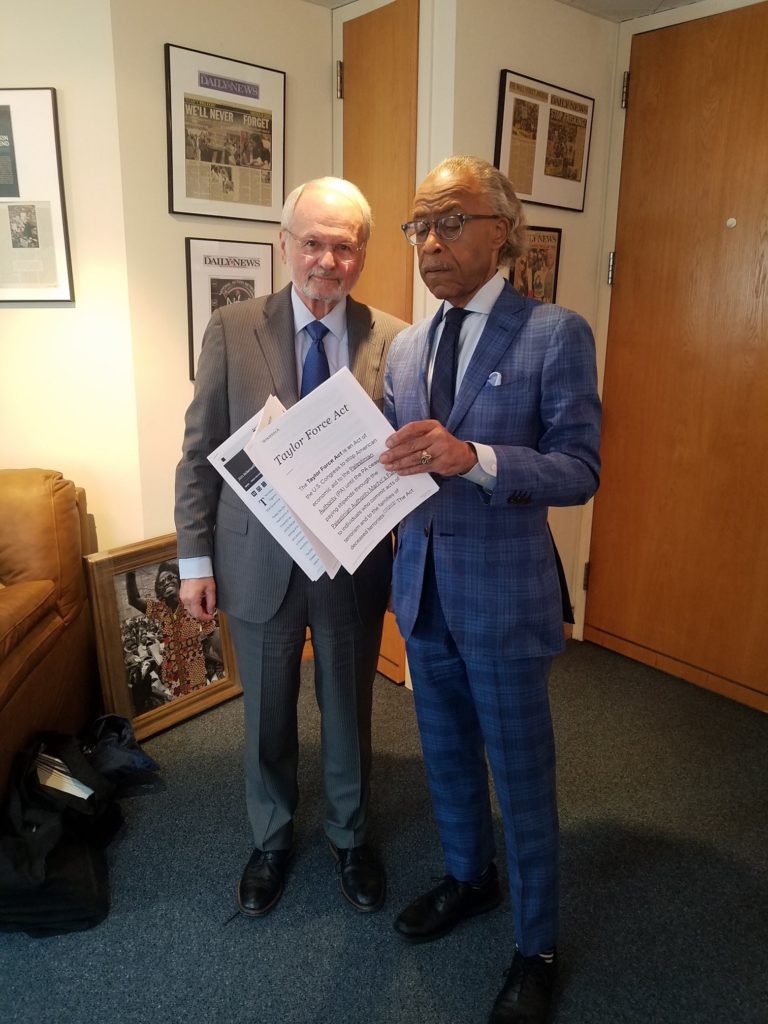By Mike Wagenheim
(MAY 2, 2023 / JNS) It was an unlikely image, to say the least. Rev. Al Sharpton tweeted a photo of himself last week with Mort Klein, national president of the Zionist Organization of America.

Much of the Jewish community has long considered Sharpton antisemitic for his incendiary rhetoric, accusing him of inciting violence against Jews back in 1991 in Brooklyn, N.Y., as part of the Crown Heights riots. He has expressed regrets about such actions in recent years, which some take as genuine remorse, though others think that he is more focused on rehabilitating his reputation.
Sharpton expressed support of Rep. Ilhan Omar (D-Minn.) in 2019, calling it “inexcusable” that Israel banned the congresswoman, who has a history of antisemitic statements, from entry the country that summer. And as recently as 2020, Klein said that the Anti-Defamation League head should not go on Sharpton’s MSNBC program, “PoliticsNation.”
Klein told JNS that he received a call from Sharpton’s National Action Network offices, looking to set up a get-together.
“A couple of his board members told Sharpton, ‘You should meet with a guy who fights for his people just as strong as you fight for the blacks,’” said Klein. “I figured if I can have a relationship with him that will help our Jewish people and Israel, I’ll do it.”
There was no preset agenda for the initial 90-minute meeting, according to Klein. Sharpton has tweeted that the meeting included Howard Teich and Michael Hardy, board member and general counsel, respectively, of National Action Network.
Klein told JNS that he sought to make common cause with civil-rights activist Sharpton, discussing his upbringing in a majority-black West Philadelphia neighborhood, as well as a friendship with Ice Cube after the rapper’s own spewing of anti-Jewish sentiment. Sharpton tried to explain his past actions that have been seen as antisemitic and said some were misrepresented in the media, according to Klein.
‘How can this be that I never heard of this?’
In a 2019 appearance in front of a Jewish audience, Sharpton acknowledged his role in stoking division and recalled how Rev. Martin Luther King Jr.’s widow chided him for his “cheap” rhetoric.
He has reportedly expressed private regrets to Jewish leaders for helping fuel the deadly Crown Heights riots in 1991, as well as denounced them publicly. He has also been accused of inciting a firebombing of a Jewish-owned clothing store in Harlem in 1995.
Sharpton has lately appealed for black-Jewish unity and has been critical of entertainer “Ye” (Kanye West) and basketball player Kyrie Irving for their antisemitic statements.
The meeting became an educational session largely, according to Klein. Although Sharpton visited Israel in 2001 and met with then-Israeli Foreign Minister Shimon Peres and, controversially, Palestinian Authority leader Yasser Arafat, much of what Klein told him last week surprised Sharpton, according to the ZOA head.
“I showed him an emblem of the Palestinian Authority—a picture of all of Israel with a keffiyeh over it, with a picture of Arafat and a Kalashnikov rifle. He was horrified,” Klein told JNS.
He also showed Sharpton posters of Jew-killing terrorists, which the P.A. put up in high schools and colleges. He told JNS that he had also thought the day before about what he could ask Sharpton to do, which would be uncontroversial, which “won’t offend his supporters, that he has no choice but to support.”
Klein decided to ask Sharpton to condemn the PA’s pay-for-slay policy, which pays salaries to terrorists, who kill and maim Jews, and to their families—increasing the amount of money based on the severity of the crimes and the casualty toll.
He also showed Sharpton literature on the Taylor Force Act, a U.S. law that withholds U.S. funding for the PA until it stops such terror payments.
“His eyes came out of his head. He said, ‘How can this be that I never heard of this?’” recounted Klein.
Sharpton told Klein—and has posted on Twitter and Instagram—that he will contact House Minority Leader Hakeem Jeffries (D-N.Y.) and the leadership of the Congressional Black Caucus to find out more about the policy and what could be done.
The two also discussed a joint Israel trip and have a follow-up meeting planned, according to Klein.
The National Action Network did not respond to JNS queries about the meeting.
This article was originally published in JNS and can be viewed here.
